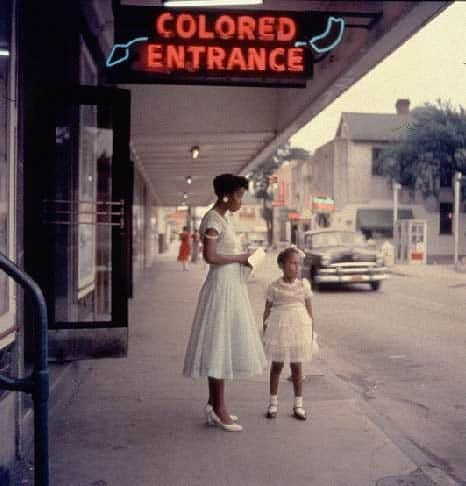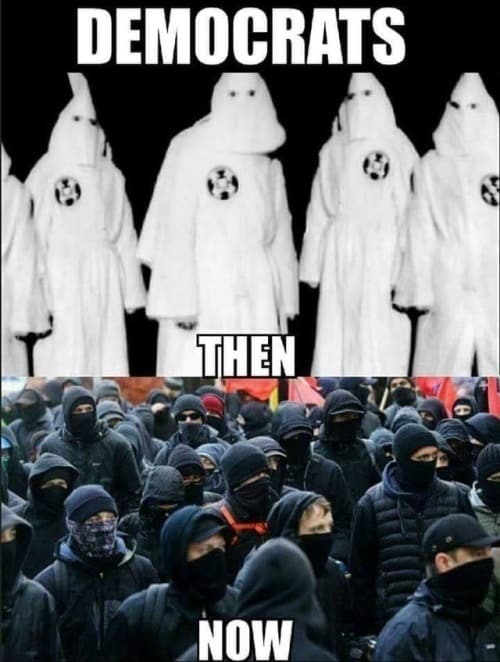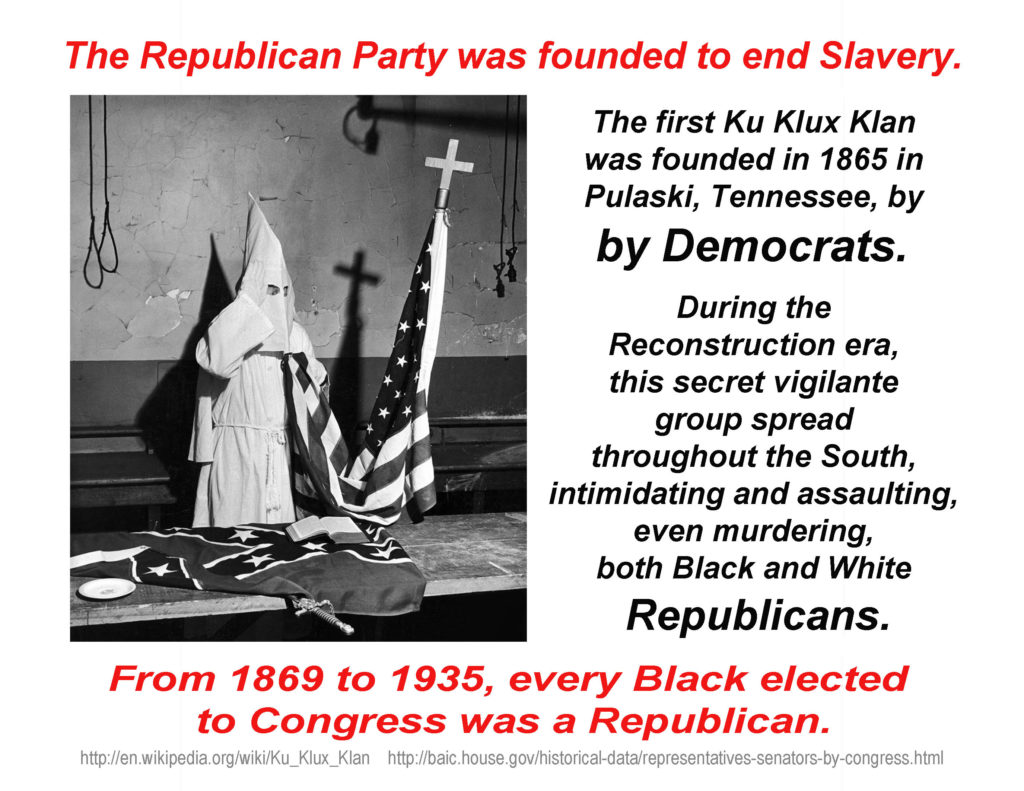Sordid History of Dem Party Against Blacks (Must Read)

Verse of the Day
Malachi 3:15 And now we call the proud happy; yea, they that work wickedness are set up; yea, they that tempt God are even delivered.
This is an incredible article showing the history of racist Democrats against black people. Today the dems try and take the moral high road when in reality this party is a stain on America. Everything they accuse America of was them! We need to know this and put these criminals on the defense and let our children know the truth.
Just like in 1860, once again, this evil is trying to start another civil war. Once again, they are trying to destroy America. The Dem party is judgment on America to the point they now are trying to destroy us with Islam! Whatever is evil, this party believes and propagates!
May the Holy God of Israel bless and protect you
Malachi 4:1 For, behold, the day cometh, that shall burn as an oven; and all the proud, yea, and all that do wickedly, shall be stubble: and the day that cometh shall burn them up, saith the LORD of hosts, that it shall leave them neither root nor branch.
It’s Like the 1950s All Over Again=> Democrats Kick Undesirable Family Out of Virginia Restaurant

“In the 1950’s Democrats refused service to blacks at restaurants and soda fountains. The laws were changed in the 1960s thanks to Republican votes. This weekend the Democrats were back at it. A Democrat restaurant owner in Virginia refused service to undesirable Sarah Sanders and her small children.”
The great danger inherent in the Democrat Party against Republicans is once again manifesting. The following are examples from history:
On September 28, 1868, a mob of Democrats massacred nearly 300 African-American Republicans in Opelousas, Louisiana. The savagery began when racist Democrats attacked a newspaper editor, a white Republican and schoolteacher for ex-slaves. Several African-Americans rushed to the assistance of their friend, and in response, Democrats went on a “Negro hunt,” killing every African-American (all of whom were Republicans) in the area they could find. (Via Grand Old Partisan)
Democrats in hoods slaughtered hundreds of Republicans and blacks across the country in the late 19th and early 20th century.
On April 20, 1871 the Republicans passed the anti-Ku Klux Klan Act outlawing Democratic terrorist groups.
Republicans led the charge on civil rights and women’s rights.
The following is a comprehensive list of organized atrocities by the Democrat Party against black people.
1854: The Republican Party is formed to “stop the spread of slavery.” The Democratic Party is decidedly…”Pro-Slavery”
March 20, 1854: Opponents of Democrats’ pro-slavery policies meet in Ripon, Wisconsin to establish the Republican Party
*Stephen Douglas, Democratic Party Leader authored the Kansas-Nebraska Act.
May 30, 1854: Democrat President Franklin Pierce signs Democrats’ Kansas-Nebraska Act, expanding slavery into U.S. territories; opponents unite to form the Republican Party
June 16, 1854: Newspaper editor Horace Greeley calls on opponents of slavery to unite in the Republican Party
July 6, 1854: First state Republican Party officially organized in Jackson, Michigan, to oppose Democrats’ pro-slavery policies
February 11, 1856: Republican Montgomery Blair argues before U.S. Supreme Court on behalf of his client, the slave Dred Scott; later served in [Republican] President Lincoln’s Cabinet
February 22, 1856: First national meeting of the Republican Party, in Pittsburgh, to coordinate opposition to Democrats’ pro-slavery policies
March 27, 1856: First meeting of Republican National Committee in Washington, DC to oppose Democrats’ pro-slavery policies
May 22, 1856: For denouncing Democrats’ pro-slavery policy, Republican U.S. Senator Charles Sumner (R-MA) is beaten nearly to death on floor of Senate by U.S. Rep. Preston Brooks (D-SC), takes three years to recover
March 6, 1857: Republican Supreme Court Justice John McLean issues strenuous dissent from decision by 7 Democrats in infamous Dred Scott case that African-Americans had no rights “which any white man was bound to respect”
June 26, 1857: former Congressman Abraham Lincoln, now a private citizen, declares Republican position that slavery is “cruelly wrong,” while Democrats “cultivate and excite hatred” for blacks
October 13, 1858: During Lincoln-Douglas debates, U.S. Senator Stephen Douglas (D-IL) states: “I do not regard the Negro as my equal, and positively deny that he is my brother, or any kin to me whatever”; Douglas became Democratic Party’s 1860 presidential nominee
October 25, 1858: U.S. Senator William Seward (R-NY) describes Democratic Party as “inextricably committed to the designs of the slaveholders”; as President Abraham Lincoln’s Secretary of State, helped draft Emancipation Proclamation
June 4, 1860: Republican U.S. Senator Charles Sumner (R-MA) delivers his classic address, The Barbarism of Slavery
*1861: Abraham Lincoln, Republican, is elected President.
*Most Democratic Party Controlled States Secede from the Union…inn Protest
April 7, 1862: President Lincoln concludes treaty with Britain for suppression of slave trade
April 16, 1862: President Lincoln signs bill abolishing slavery in District of Columbia;
Republican Support: 83% Democrats Support: 17%
July 2, 1862: U.S. Rep. Justin Morrill (R-VT) wins passage of Land Grant Act, establishing colleges open to African-Americans, including such students as George Washington Carver
July 17, 1862: Over unanimous Democrat opposition, Republican Congress passes Confiscation Act stating that slaves of the Confederacy “shall be forever free”
August 19, 1862: Republican newspaper editor Horace Greeley writes Prayer of Twenty Millions, calling on President Lincoln to declare emancipation
August 25, 1862: President Abraham Lincoln authorizes enlistment of African-American soldiers in U.S. Army
September 22, 1862: Republican President Abraham Lincoln issues preliminary Emancipation Proclamation
January 1, 1863: Emancipation Proclamation, implementing the Republicans’ Confiscation Act of 1862, takes effect
February 9, 1864: Susan B. Anthony and Elizabeth Cady Stanton deliver over 100,000 signatures to U.S. Senate supporting Republicans’ plans for constitutional amendment to ban slavery
June 15, 1864: Republican Congress votes equal pay for African-American troops serving in U.S. Army during Civil War
June 28, 1864: Republican majority in Congress repeals Fugitive Slave Acts
October 29, 1864: African-American abolitionist Sojourner Truth says of President Lincoln: “I never was treated by anyone with more kindness and cordiality than were shown to me by that great and good man”
January 31, 1865: 13th Amendment banning slavery passed by U.S. House with unanimous Republican support, intense Democrat opposition
Republican Party Support: 100% Democratic Party Support: 23%
March 3, 1865: Republican Congress establishes Freedmen’s Bureau to provide health care, education, and technical assistance to emancipated slaves
April 8, 1865: 13th Amendment banning slavery passed by U.S. Senate
Republican support 100% Democrat support 37%
June 19, 1865: On “Juneteenth,” U.S. troops land in Galveston, TX to enforce ban on slavery that had been declared more than two years before by the Emancipation Proclamation
November 22, 1865: Republicans denounce Democrat legislature of Mississippi for enacting “black codes,” which institutionalized racial discrimination
1866: The Republican Party passes the Civil Rights Act of 1866 to protect the rights of newly freed slaves
December 6, 1865: Republican Party’s 13th Amendment, banning slavery, is ratified
*1865: The KKK launches as the “Terrorist Arm” of the Democratic Party
Confederate General who Founded the KKK: Democrat Nathan Bedford Forrest
February 5, 1866: U.S. Rep. Thaddeus Stevens (R-PA) introduces legislation, successfully opposed by Democrat President Andrew Johnson, to implement “40 acres and a mule” relief by distributing land to former slaves
April 9, 1866: Republican Congress overrides Democrat President Johnson’s veto; Civil Rights Act of 1866, conferring rights of citizenship on African-Americans, becomes law
April 19, 1866: Thousands assemble in Washington, DC to celebrate Republican Party’s abolition of slavery
May 10, 1866: U.S. House passes Republicans’ 14th Amendment guaranteeing due process and equal protection of the laws to all citizens; 100% of Democrats vote no
June 8, 1866: U.S. Senate passes Republicans’ 14th Amendment guaranteeing due process and equal protection of the law to all citizens; 94% of Republicans vote yes and 100% of Democrats vote no
July 16, 1866: Republican Congress overrides Democrat President Andrew Johnson’s veto of Freedman’s Bureau Act, which protected former slaves from “black codes” denying their rights
July 28, 1866: Republican Congress authorizes formation of the Buffalo Soldiers, two regiments of African-American cavalrymen
July 30, 1866: Democrat-controlled City of New Orleans orders police to storm racially-integrated Republican meeting; raid kills 40 and wounds more than 150
January 8, 1867: Republicans override Democrat President Andrew Johnson’s veto of law granting voting rights to African-Americans in D.C.
July 19, 1867: Republican Congress overrides Democrat President Andrew Johnson’s veto of legislation protecting voting rights of African-Americans
March 30, 1868: Republicans begin impeachment trial of Democrat President Andrew Johnson, who declared: “This is a country for white men, and by God, as long as I am President, it shall be a government of white men”
May 20, 1868: Republican National Convention marks debut of African-American politicians on national stage; two – Pinckney Pinchback and James Harris – attend as delegates, and several serve as presidential electors
1868 (July 9): 14th Amendment passes and recognizes newly freed slaves as U.S. Citizens
Republican Party Support: 94% Democratic Party Support: 0%
September 3, 1868: 25 African-Americans in Georgia legislature, all Republicans, expelled by Democrat majority; later reinstated by Republican Congress
September 12, 1868: Civil rights activist Tunis Campbell and all other African-Americans in Georgia Senate, every one a Republican, expelled by Democrat majority; would later be reinstated by Republican Congress
September 28, 1868: Democrats in Opelousas, Louisiana murder nearly 300 African-Americans who tried to prevent an assault against a Republican newspaper editor
October 7, 1868: Republicans denounce Democratic Party’s national campaign theme: “This is a white man’s country: Let white men rule”
October 22, 1868: While campaigning for re-election, Republican U.S. Rep. James Hinds (R-AR) is assassinated by Democrat terrorists who organized as the Ku Klux Klan
November 3, 1868: Republican Ulysses Grant defeats Democrat Horatio Seymour in presidential election; Seymour had denounced Emancipation Proclamation
December 10, 1869: Republican Gov. John Campbell of Wyoming Territory signs FIRST-in-nation law granting women right to vote and to hold public office
February 3, 1870: The US House ratifies the 15th Amendment granting voting rights to all Americans regardless of race
Republican support: 97% Democrat support: 3%
February 25, 1870: Hiram Rhodes Revels becomes the first Black seated in the US Senate, becoming the First Black in Congress and the first Black Senator.
May 19, 1870: African American John Langston, law professor and future Republican Congressman from Virginia, delivers influential speech supporting President Ulysses Grant’s civil rights policies
May 31, 1870: President U.S. Grant signs Republicans’ Enforcement Act, providing stiff penalties for depriving any American’s civil rights
June 22, 1870: Republican Congress creates U.S. Department of Justice, to safeguard the civil rights of African-Americans against Democrats in the South
September 6, 1870: Women vote in Wyoming, in FIRST election after women’s suffrage signed into law by Republican Gov. John Campbell
December 12, 1870: Republican Joseph Hayne Rainey becomes the first Black duly elected by the people and the first Black in the US House of Representatives
In 1870 and 1871, along with Revels (R-Miss) and Rainey (R-SC), other Blacks were elected to Congress from Alabama, Florida, Georgia, Louisiana, Mississippi, North Carolina and Virginia – all Republicans.
A Black Democrat Senator didn’t show up on Capitol Hill until 1993. The first Black Congressman was not elected until 1935.
February 28, 1871: Republican Congress passes Enforcement Act providing federal protection for African-American voters
March 22, 1871: Spartansburg Republican newspaper denounces Ku Klux Klan campaign to eradicate the Republican Party in South Carolina
April 20, 1871: Republican Congress enacts the (anti) Ku Klux Klan Act, outlawing Democratic Party-affiliated terrorist groups which oppressed African-Americans
October 10, 1871: Following warnings by Philadelphia Democrats against black voting, African-American Republican civil rights activist Octavius Catto murdered by Democratic Party operative; his military funeral was attended by thousands
October 18, 1871: After violence against Republicans in South Carolina, President Ulysses Grant deploys U.S. troops to combat Democrat terrorists who formed the Ku Klux Klan
November 18, 1872: Susan B. Anthony arrested for voting, after boasting to Elizabeth Cady Stanton that she voted for “the Republican ticket, straight”
January 17, 1874: Armed Democrats seize Texas state government, ending Republican efforts to racially integrate government
September 14, 1874: Democrat white supremacists seize Louisiana statehouse in attempt to overthrow racially-integrated administration of Republican Governor William Kellogg; 27 killed
1875 (March 1): The Civil Rights Act of 1875 passes. It is the First Anti-Discrimination Law in America
March 1, 1875: Civil Rights Act of 1875, guaranteeing access to public accommodations without regard to race, signed by Republican President U.S. Grant
Republican support: 92% Democrat support: 0%
September 20, 1876: Former state Attorney General Robert Ingersoll (R-IL) tells veterans: “Every man that loved slavery better than liberty was a Democrat… I am a Republican because it is the only free party that ever existed”
January 10, 1878: U.S. Senator Aaron Sargent (R-CA) introduces Susan B. Anthony amendment for women’s suffrage; Democrat-controlled Senate defeated it 4 times before election of Republican House and Senate guaranteed its approval in 1919
July 14, 1884: Republicans criticize Democratic Party’s nomination of racist U.S. Senator Thomas Hendricks (D-IN) for vice president; he had voted against the 13th Amendment banning slavery
August 30, 1890: Republican President Benjamin Harrison signs legislation by U.S. Senator Justin Morrill (R-VT) making African-Americans eligible for land-grant colleges in the South
June 7, 1892: In a FIRST for a major U.S. political party, two women – Theresa Jenkins and Cora Carleton – attend Republican National Convention in an official capacity, as alternate delegates
February 8, 1894: Democrat Congress and Democrat President Grover Cleveland join to repeal Republicans’ Enforcement Act, which had enabled African-Americans to vote
December 11, 1895: African-American Republican and former U.S. Rep. Thomas Miller (R-SC) denounces new state constitution written to disenfranchise African-Americans
May 18, 1896: Republican Justice John Marshall Harlan, dissenting from Supreme Court’s notorious Plessy v. Ferguson “separate but equal” decision, declares: “Our Constitution is color-blind, and neither knows nor tolerates classes among citizens”
December 31, 1898: Republican Theodore Roosevelt becomes Governor of New York; in 1900, he outlawed racial segregation in New York public schools
May 24, 1900: Republicans vote no in referendum for constitutional convention in Virginia, designed to create a new state constitution disenfranchising African-Americans
January 15, 1901: Republican Booker T. Washington protests Alabama Democratic Party’s refusal to permit voting by African-Americans
October 16, 1901: President Theodore Roosevelt invites Booker T. Washington to dine at White House, sparking protests by Democrats across the country
May 29, 1902: Virginia Democrats implement new state constitution, condemned by Republicans as illegal, reducing African-American voter registration by 86%
February 12, 1909: On 100th anniversary of Abraham Lincoln’s birth, African-American Republicans and women’s suffragists Ida Wells and Mary Terrell co-found the NAACP
June 18, 1912: African-American Robert Church, founder of Lincoln Leagues to register black voters in Tennessee, attends 1912 Republican National Convention as delegate; eventually serves as delegate at 8 conventions
*1914: Democratic President Woodrow Wilson Segregates the Federal Government and the US Military – REVERSING 50 years of previous integration
*1915: Democratic President Woodrow Wilson showcases the first movie ever shown in the White House – Birth of a Nation – The Ku Klux Klan Epic
August 1, 1916: Republican presidential candidate Charles Evans Hughes, former New York Governor and U.S. Supreme Court Justice, endorses women’s suffrage constitutional amendment; he would become Secretary of State and Chief Justice
May 21, 1919: Republican House passes constitutional amendment granting women the vote with 85% of Republicans in favor, but only 54% of Democrats; in Senate, 80% of Republicans would vote yes, but almost half of Democrats no
April 18, 1920: Minnesota’s FIRST-in-the-nation anti-lynching law, promoted by African-American Republican Nellie Francis, signed by Republican Gov. Jacob Preus
August 18, 1920: Republican-authored 19th Amendment, giving women the vote, becomes part of Constitution; 26 of the 36 states to ratify had Republican-controlled legislatures
January 26, 1922: House passes bill authored by U.S. Rep. Leonidas Dyer (R-MO) making lynching a federal crime; Senate Democrats block it with filibuster
*119 Members voted AGAINST the Bill. OF THE 199, 103 were members of the Democratic Party
June 2, 1924: Republican President Calvin Coolidge signs bill passed by Republican Congress granting U.S. citizenship to all Native Americans
October 3, 1924: Republicans denounce three-time Democrat presidential nominee William Jennings Bryan for defending the Ku Klux Klan at 1924 Democratic National Convention
December 8, 1924: Democratic presidential candidate John W. Davis argues in favor of “separate but equal”
June 12, 1929: First Lady Lou Hoover invites wife of U.S. Rep. Oscar De Priest (R-IL), an African-American, to tea at the White House, sparking protests by Democrats across the country
August 17, 1937: Republicans organize opposition to former Ku Klux Klansman and Democrat U.S. Senator Hugo Black, appointed to U.S. Supreme Court by FDR; his Klan background was hidden until after confirmation
June 24, 1940: Republican Party platform calls for integration of the armed forces; for the balance of his terms in office, FDR refuses to order it
October 20, 1942: 60 prominent African-Americans issue Durham Manifesto, calling on southern Democrats to abolish their all-white primaries
April 3, 1944: U.S. Supreme Court strikes down Texas Democratic Party’s “whites only” primary election system
August 8, 1945: Republicans condemn Harry Truman’s surprise use of the atomic bomb in Japan. The whining and criticism goes on for years. It begins two days after the Hiroshima bombing, when former Republican President Herbert Hoover writes to a friend that “[t]he use of the atomic bomb, with its indiscriminate killing of women and children, revolts my soul.”
February 18, 1946: Appointed by Republican President Calvin Coolidge, federal judge Paul McCormick ends segregation of Mexican-American children in California public schools
July 11, 1952: Republican Party platform condemns “duplicity and insincerity” of Democrats in racial matters
September 30, 1953: Earl Warren, California’s three-term Republican Governor and 1948 Republican vice presidential nominee, nominated to be Chief Justice; wrote landmark decision in Brown v. Board of Education
December 8, 1953: Eisenhower administration Asst. Attorney General Lee Rankin argues for plaintiffs in Brown v. Board of Education
May 17, 1954: Chief Justice Earl Warren, three-term Republican Governor (CA) and Republican vice presidential nominee in 1948, wins unanimous support of Supreme Court for school desegregation in Brown v. Board of Education
November 25, 1955: Eisenhower administration bans racial segregation of interstate bus travel
March 12, 1956: Ninety-seven Democrats in Congress condemn Supreme Court’s decision in Brown v. Board of Education, and pledge to continue segregation
June 5, 1956: Republican federal judge Frank Johnson rules in favor of Rosa Parks in decision striking down “blacks in the back of the bus” law
October 19, 1956: On campaign trail, Vice President Richard Nixon vows: “American boys and girls shall sit, side by side, at any school – public or private – with no regard paid to the color of their skin. Segregation, discrimination, and prejudice have no place in America”
November 6, 1956: African-American civil rights leaders Martin Luther King and Ralph Abernathy vote for Republican Dwight Eisenhower for President
*1957 (September 9): Republican President Dwight Eisenhower passes the First Civil Rights Law in 82 years…CRA 1957
*The Democratic Party Filibuster the Bill
*Republican Party Support: 92%
*Democratic Party Support: 54%September 24, 1957: Sparking criticism from Democrats such as Senators John Kennedy and Lyndon Johnson, President Dwight Eisenhower deploys the 82nd Airborne Division to Little Rock, AR to force Democrat Governor Orval Faubus to integrate public schools
June 23, 1958: President Dwight Eisenhower meets with Martin Luther King and other African-American leaders to discuss plans to advance civil rights
February 4, 1959: President Eisenhower informs Republican leaders of his plan to introduce 1960 Civil Rights Act, despite staunch opposition from many Democrats
May 6, 1960: President Dwight Eisenhower signs Republicans’ Civil Rights Act of 1960, overcoming 125-hour, around-the-clock filibuster by 18 Senate Democrats
*The Democratic Party Filibuster the Bill
*Republican Party Support: 93% *Democratic Party Support: 68%
July 27, 1960: At Republican National Convention, Vice President and eventual presidential nominee Richard Nixon insists on strong civil rights plank in platform
May 2, 1963: Republicans condemn Democrat sheriff of Birmingham, AL for arresting over 2,000 African-American schoolchildren marching for their civil rights
June 1, 1963: Democrat Governor George Wallace announces defiance of court order issued by Republican federal judge Frank Johnson to integrate University of Alabama
September 29, 1963: Gov. George Wallace (D-AL) defies order by U.S. District Judge Frank Johnson, appointed by President Dwight Eisenhower, to integrate Tuskegee High School
June 9, 1964: Republicans condemn 14-hour filibuster against 1964 Civil Rights Act by Democrat Senator Strom Thurmond and U.S. Senator and former Ku Klux Klansman Robert Byrd (D-WV), who served in the U.S. Senate until his death in mid-2010.
June 10, 1964: Senate Minority Leader Everett Dirksen (R-IL) criticizes Democrat filibuster against 1964 Civil Rights Act, calls on Democrats to stop opposing racial equality
The Civil Rights Act of 1964 was introduced and approved by a majority of Republicans in the Senate. The Act was opposed by most southern Democrat senators, several of whom were proud segregationists—one of them being Al Gore Sr. Democrat President Lyndon B. Johnson relied on Illinois Senator Everett Dirksen, the Republican leader from Illinois, to get the Act passed.
*1964: The Civil Rights Act of 1964 passes due to Republican Minority Leader Everett M. Dirksen’s perseverance.
*The Bill is Filibustered by the Democratic Party
*Republican Party Support: 80% *Democratic Party Support: 63%
March 21, 1965: Republican federal judge Frank Johnson authorizes Martin Luther King’s protest march from Selma to Montgomery, overruling Democrat Governor George Wallace
June 20, 1964: The Chicago Defender, renowned African-American newspaper, praises Senate Republican Leader Everett Dirksen (R-IL) for leading passage of 1964 Civil Rights Act
March 7, 1965: Police under the command of Democrat Governor George Wallace attack African-Americans demonstrating for voting rights in Selma, AL
August 4, 1965: Senate Republican Leader Everett Dirksen (R-IL) overcomes Democrat attempts to block 1965 Voting Rights Act; 94% of Senate Republicans vote for landmark civil right legislation, while 27% of Democrats oppose
August 6, 1965: Voting Rights Act of 1965, abolishing literacy tests and other measures devised by Democrats to prevent African-Americans from voting, signed into law; higher percentage of Republicans than Democrats vote in favor
July 8, 1970: In special message to Congress, President Richard Nixon calls for reversal of policy of forced termination of Native American rights and benefits
September 17, 1971: Former Ku Klux Klan member and Democrat U.S. Senator Hugo Black (D-AL) retires from U.S. Supreme Court; appointed by FDR in 1937, he had defended Klansmen for racial murders
February 19, 1976: President Gerald Ford formally rescinds President Franklin Roosevelt’s notorious Executive Order authorizing internment of over 120,000 Japanese-Americans during WWII
September 15, 1981: President Ronald Reagan establishes the White House Initiative on Historically Black Colleges and Universities, to increase African-American participation in federal education programs
June 29, 1982: President Ronald Reagan signs 25-year extension of 1965 Voting Rights Act
August 10, 1988: President Ronald Reagan signs Civil Liberties Act of 1988, compensating Japanese-Americans for deprivation of civil rights and property during World War II internment ordered by FDR
November 21, 1991: President George H. W. Bush signs Civil Rights Act of 1991 to strengthen federal civil rights legislation
August 20, 1996: Bill authored by U.S. Rep. Susan Molinari (R-NY) to prohibit racial discrimination in adoptions, part of Republicans’ Contract With America, becomes law
April 26, 1999: Legislation authored by U.S. Senator Spencer Abraham (R-MI) awarding Congressional Gold Medal to civil rights pioneer Rosa Parks is transmitted to President
January 25, 2001: U.S. Senate Republican Policy Committee declares school choice to be “Educational Emancipation”
March 19, 2003: Republican U.S. Representatives of Hispanic and Portuguese descent form Congressional Hispanic Conference
May 23, 2003: U.S. Senator Sam Brownback (R-KS) introduces bill to establish National Museum of African American History and Culture
February 26, 2004: Hispanic Republican U.S. Rep. Henry Bonilla (R-TX) condemns racist comments by U.S. Rep. Corrine Brown (D-FL); she had called Asst. Secretary of State Roger Noriega and several Hispanic Congressmen “a bunch of white men…you all look alike to me.”
This list was originally compiled by Michael Zak at Grand Ole Partisan and then posted at Free Republic:
(For more connections see: http://www.maggiesnotebook.com/2012/08/civil-rights-racism-democrats-controlled-everything-but-would-not-pass-civil-rights-the-history-the-timeline-of-democrat-racism/)
Revelation 22:20 He which testifieth these things saith, Surely I come quickly. Amen.Even so, come, Lord Jesus.










Father God,bring this to light to not only us who believe You,but to the culture at large.Let truth meet them at their face.
History tells the facts, the facts tell the truth and the truth sets us free. By the grace of God we are the higher intelligence on this earth and given free choice and decision.